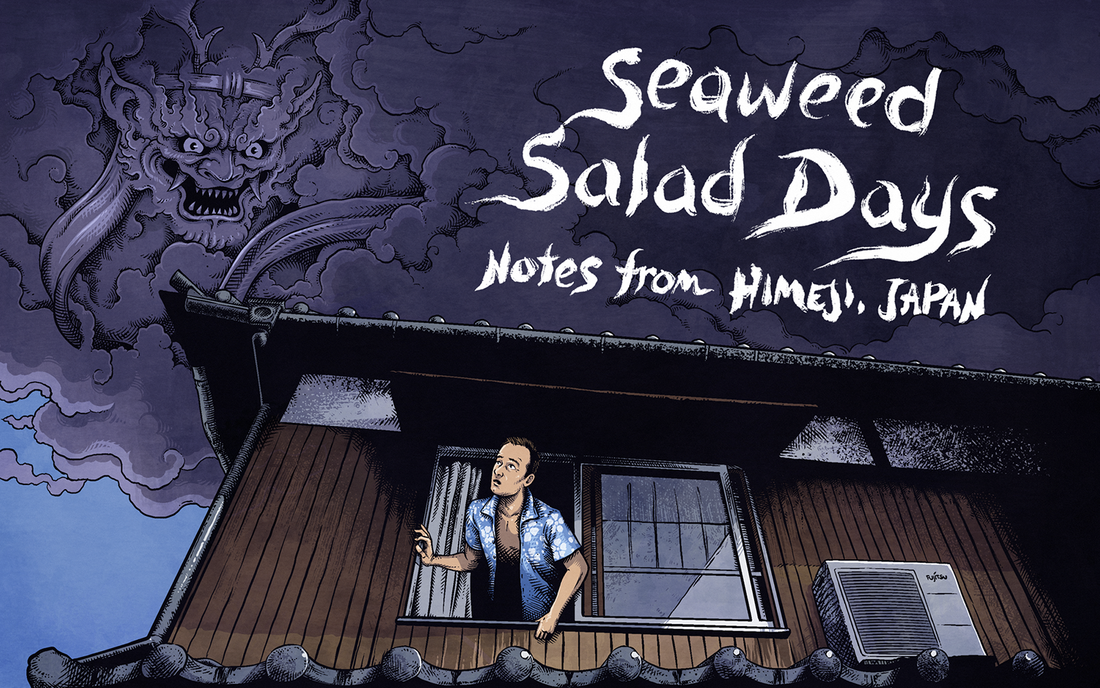|
In 2013, I wrote about Running Man, Drill Rider, Newspaper Dude, and Miss High Heels, in a post entitled “Life in Japan: Sounds of the Good Hood”. I’m happy (and somewhat sad) to report that their sound signatures no longer fill my waking and sleeping hours. Since moving to a new neighborhood, a whole different set of sounds ring in and ring out my working day. To explain … At 5 a.m., birdlife creeps down nearby Mount Hiromine, tree by tree, bush by bush, to unleash all cacophonous hell on the sleepy and sleepless of this hood. Far more preferable is to have one's eyelids raised by the temple bell at 6 a.m. — a soft, resonating peal that brings the soul gently back from Nirvana. The bulbuls, skylarks, and wagtails are soon drowned out by the migrating crows. Their daily flight path between mountain and city lies directly over my house, so any lingering dreams I might be having of bikini girls with angel wings are dissolved by an evil, cawing din. By this time, the distant hum of commuter traffic has risen. If the wind is blowing off the Seto Inland Sea, I might even hear the muffled roar of a shinkansen slipping through the city at 320 kilometres per hour. But these are all the sounds from beyond the hood. At 7 a.m., our community's tannoy speaker croaks to life. From it comes the slow, measured voice of a village elder delivering a rubbish collection notice, or lost cat announcement … nothing to leap out of bed over. Like the birds, the neighbours rise early; the truck driver next door — the dude with the smoky baritone — has already jogged his two shitsu around the block, downed his coffee, and punched the ignition on his three-tonne Hino, before I’ve even pressed my soles to the tatami. Timeliness is next to godliness in Japan, and although punctuality means predictability (which can be a bore), in this uncertain world that’s not such a bad thing. At 7:30 a.m. the neighbourhood kids pour from their homes with their mothers screaming blue murder and blowing sweet kisses in the same breath. With their clanking water bottles and faux-leather backpacks, they shuffle off to join their platoons, which join other platoons, until a regimental-strength river of white caps, the laughing and shouting foot soldiers of the Ministry of Education, wends its way into the distance, fading into other sounds of Good Morning Japan. These might be the distinctive call of the camion driver who cruises the streets asking for your bundles of old newspapers in exchange for rolls of toilet paper, or the guy who sells warabi-mochi (sweet cakes made from mountain fern starch), or on dark winter nights, the faceless driver who tempts with roast sweet potatoes right off the coals. But it is now mid-May and all else is drowned out by the incessant drumming of rain on tiled roofs. The wet season has arrived two weeks early. Soon the rice paddy at the end of my street will be flooded in preparation for rice planting, and once topped up by rain, the biggest swimming school for amphibians will again be open for business. By June, the frog noise builds to a wall of sound, nauseating, disorientating ... and oddly quadraphonic, so that on hot summer nights when my balcony doors are open, I think I hear them popping, croaking and chirping beneath my bed, behind my bookshelf Buddha, inside my smalls drawer ... At 5:30 p.m. the tannoy system sounds again — this time to remind all kids playing outside to go home for dinner. It might also be followed by a miscellaneous announcement, like one from the nearby Japanese Self Defense Force base to say that Howitzer 155mm (blank) firing drills will take place the following morning at 9:30 hrs. It’s good to know this because the percussive booms and rattling window panes can make you choke on your cornflakes. A few years ago, there was a broadcast to say that a bear had been sighted wandering the neighbouring machi (town), though this was later downgraded to a large wild boar just snooping about. At 6 p.m. the crows drift back to their mountain roosts and the temple bell bongs three times. Another day, another fistful of yen for the workers. The weary denizens of the hood settle at their kitchen tables, turn up the TV baseball, tip down their low-malt beer, and tune out to the worries of the world. By 7 p.m. the last piano students have left the music teacher’s house down the street. Beethoven and Bach have been retired and a new nocturne, known and loved by all, fills the humid night air. Not even the frogs can dampen the enthusiasm of the piano teacher when she plays The Tequila Song. Blog post: “Life in Japan: Sounds of the Good Hood”
2 Comments
|
This Blog:What is the essence of a traditional Japanese neighbourhood? Writing from my home in Himeji, a castle town in western Honshu, Seaweed Salad Days distills, ferments, presents! Archives
March 2024
Categories
All
|

 RSS Feed
RSS Feed
